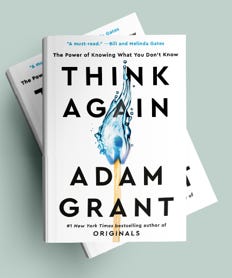Hello Friends!
Greetings from Barcelona ☀️where we have been on Easter break, enjoying a week-long staycation.
Many thanks for your feedback on the last edition of The Quest. I loved hearing your comments on my new Creativity Kickstarter e-book. If you haven’t seen it yet you can download it for free here💥. A special shout out to Gani from Cornwall, Michaele and Barry from Bracebridge, Connie from Toronto, and Maria from Miami 🙌.
If you are joining The Quest for the first time, welcome to our weekly exploration of creativity, facilitation, and learning.
You can catch up on last week’s edition on creating psychological safety, and all past editions here.
This week we’ll be exploring uncertainty🔎
Seven ways to cope with uncertainty
Thinking and re-thinking
What we can learn from Quantum Physics
A fun way to exercise your ambiguity muscles
Free courses and more!
Let’s dive right in.
It’s usually about this time of the year when I realize that I am way behind in organizing our summer plans.
We start dreaming up exciting plans only to find that everything is booked.
This year is different. There is availability. But we are planning with a bunch of unknowns.
❓Will we be confined to our town or will we be able to travel further afield?
❓Will airports be open or should we be planning a road trip?
❓Will borders be open or closed?
❓Will we need to quarantine?
❓Will we need a COVID test?
❓Will there be curfews? Will restaurants be open?
❓Is it even safe to travel?
There are no firm answers to any of these questions. So I’ve gone ahead and booked not one but three trips based on my best guesses to these questions.
With the information I have right now, come July we will most likely be enjoying our next staycation right here at home. But like my husband says, “it doesn’t cost anything to dream”. Especially when you have free cancellation.
COVID has increased uncertainty in every aspect of our lives. In some cases with very high stakes. It impacts travel, jobs, health, school, relationships, and more.
This can be hard given that we are wired to resist uncertainty.
But embracing ambiguity helps us to boost our creativity, and to find new solutions to the challenges we face.
So what kinds of mindsets and strategies do we need to develop to live well with uncertainty? That is our quest for this week.
🧭Seven Ways to Cope with Uncertainty
This article from the Greater Good Science Center helped me understand why uncertainty is a struggle. It turns out that we crave information about the future in the same way we crave food, sex, and other primary rewards. Our internal threat detection system is set up to protect us from ambiguity. The problem is that we can never know what the future will bring. The article offers up strategies for learning to live with uncertainty.
What are your strategies for dealing with uncertainty?
💭Think Again
This week I immersed myself in the wonderful world of award-winning Wharton professor, organizational psychologist, TED talker, author, and podcaster Adam Grant. He has published a new book called Think Again. The Power of Knowing What You Don’t Know. He argues that in an ever-changing world we need to focus on re-thinking rather than getting stuck in our convictions and beliefs.
He describes re-thinking it as a mindset. It involves a willingness to accept that the facts can change, and what was once true is no longer the case.
Re-thinking requires us to be better at asking questions, listening, and practicing humility. He says that we all need to think more like a scientist. Actively searching for reasons why we might be wrong and revising our views based on what we learn.
Check out the book on the Adam Grant website
Read the book summary
Listen to the JJ Abrams interview with Adam Grant on his podcast WorkLife
Watch the Politics and Prose video interview with Adam Grant and Angela Duckworth video
What assumptions and beliefs are you re-thinking?
🔬The Surprising Power of Uncertainty
Speaking of thinking like a scientist, my research on uncertainty led me to a TED Talk by Quantum Physicist Shohini Gose.
As a non-scientist, I get a bit intimidated when I read words like quantum physics. But Gose has the gift of being able to explain complex concepts in plain language.
In her TED talk, Gose talks about how quantum physics differs from other branches of science: uncertainty is built into the theory itself.
It embraces the idea that certain things are fundamentally unknowable and what that means for our ability to understand and control the world around us. Watch the video here.
If you really want to sharpen your scientist-thinking skills, here is a list of Top 10 Most Useful Online Courses That Are Free. Most are MOOCs from Harvard and Stanford and cover medical neuroscience, quantum mechanics, organic chemistry, and more.
🌫️Tolerate the Ambiguity!
A video on Creatubeity by Children’s author Barney Saltzberg and creativity expert Dr. Cyndi Burnett. In it, Saltzberg shares his creative process. He talks about how he moves through the “fog of ambiguity” to come up with creative ideas, characters, and books. He shares a quick and fun exercise called “notagami”. It’s all about trying something out and seeing what happens. Try it out here.

How do you exercise your ambiguity muscles?
Quote of the week
“Uncertainty is the only certainty there is, and knowing how to live with insecurity is the only security.”
John Allen Paulos, Author and Mathematician
Thanks for reading The Quest. I always love hearing your feedback and suggestions. Leave a comment below👇or hit reply to share your thoughts and ideas. Visit my website for ways we can work together here.
If you are enjoying The Quest, I'd appreciate it if you shared it with anyone you think might like it.
Until next week!
P.S. If you were forwarded this email, you can subscribe to The Quest here:






